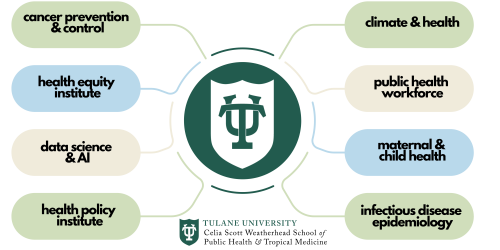Strategic Initiatives

Nothing about public health remains static. Although public health and hygiene has been a professional field for well more than a century, the areas practitioners are involved in change and expand as the needs of the public do as well.
Toward that end, Dr. Thomas LaVeist, dean of the Tulane University School of Public Health and Tropical Medicine, has identified eight key strategic growth areas for public health. Dean LaVeist has gathered key faculty from across the school, knowledgeable partners across the university, and noted authorities from the non-profit, governmental, and corporate worlds to discuss these areas and consider what’s next and what’s needed from the public health community.
For some of these areas, the school already has extensive experience and background to commit; others represent growth areas within public health and the school particularly. Outcomes for these objectives cover both academics and research opportunities. All engender tremendous excitement from our faculty, students, and alumni, and will be a large draw for the next wave of innovative researchers and public health students.
Maternal and Child Health
In Louisiana, we have some of the highest rates of maternal mortality. With the breadth and depth of maternal and child health expertise at the Celia Scott Weatherhead School of Public Health and Tropical Medicine, there is no better time to declare a strategic focus on changing these and related outcomes. We are gathering the vast experts within the Celia Scott Weatherhead School of Public Health, along with their strong partnerships among groups in New Orleans, Louisiana, and across the region, to directly impact the health outcomes of women, children, and birthing people in the South for the better.

Health Policy Institute
This initiative will be led by alumnus Chip Kahn, a leading national voice in the area of health policy. Healthcare is and will continue to be one of the key issues in American discourse. Numerous policy issues confront lawmakers, practitioners, and the public at large, issues that need to be examined, explored, and assessed. A world-class institute focused on issues of health policy centrally located in the Gulf South would provide much needed research and advocacy on a wide range of issues impacting the healthcare field today and into the future.
Artificial Intelligence and Data Science
AI is a tool – and one that the public health community can and should be using to more effectively and efficiently address barriers to good health. The professional and academic public health communities will need to be well-versed in this technology, and researchers with skills in this area are already planning ways to not only house AI and machine-learning expertise at the Celia Scott Weatherhead School of Public Health and Tropical Medicine at Tulane University, but also provide a symposium and other methods to train current and future practitioners. An overview of the Initiative, including links to the September 2025 Research Symposium: Demystifying AI in Public Health, ongoing AI/ML research in the school, and the WSPH monthly AI in Public Health Speaker Series can be found here.
Public Health Workforce
Only 1 in 5 state and local public health employees have formal training in public health. The Celia Scott Weatherhead School of Public Health and Tropical Medicine will invest in this workforce, creating a certificate program that will provide essential training to public health professionals in state and local health departments, starting here in New Orleans, and expanding to Louisiana and the broader South. With a Tulane certificate, these professionals will be equipped with the knowledge and skills they need to elevate public health work across the region, and be one-third of the way to an MPH degree.
Climate and Health
Led by Environmental Health Sciences Chair Melissa Gonzales, this initiative also has a special focus on the South, particularly the Gulf South stretching from Texas to Florida. This subtropical region has already experienced negative impacts from climate change that are expected to only grow worse. With a particular focus on the health impacts resulting from climate change, the school intends to establish a major center of research covering increasing vector-borne disease, air pollution, food and water security, disaster management, and more. This topic, however, is much larger than one discipline, and the school is already in collaboration with the School of Architecture, the School of Science and Engineering, and the ByWater Institute to develop cross-disciplinary educational programs designed to train the next generation of researchers and practitioners addressing climate change. A symposium and lecture series are already underway, with an inaugural report on climate change in the Gulf South to be unveiled on Earth Day 2025.

Cancer Prevention and Control
Louisiana is ranked 5th in the nation for all cancer mortality, with an 85-mile stretch along the Mississippi River between Baton Rouge and New Orleans representing some of the highest incidence rates in the world. Despite those devastating statistics, the state does not have a Comprehensive Cancer Center providing transdisciplinary research as a bridge between science and practice. The university already has a cancer center that has been led for many years by WSPH epidemiologist Prescott Deininger who will now take on this strategic initiative for the school. The time is right with Tulane recently finalizing a partnership with LCMC Health to expand comprehensive and specialty care across Southeast Louisiana. Louisiana deserves innovative, world-class research and training to address the cancer crisis, and the Celia Scott Weatherhead School of Public Health is uniquely positioned to train the next generation of interdisciplinary cancer researchers to affect the health of our Gulf Coast communities.
Health Equity Research
As one of the leading national voices in health equity, Dean LaVeist is no stranger to this topic, and indeed the school has extensive initiatives already underway. These range from the Partners for Advancing Health Equity (P4HE) learning collaborative sponsored by the Robert Wood Johnson Foundation to the Society, Health, and Racial Equity Lab (SHARE) that approaches equity from a social-ecological lens to the Cost of Inequity, a report, and website that quantifies the economic burden of health inequity to the U.S.
Advancing health equity outcomes, particularly in the South is a key component of this initiative. The school will continue to strengthen long-standing ties to the community, with an interest in developing a report on the status of health equity in the South. Health equity considerations have already been baked into academics at WSPH, but plans are underway to also add a specialization area in health equity to train more public health practitioners with in-depth knowledge on this topic.

Infectious Disease Epidemiology
If COVID-19 has taught us anything, it’s that we don’t know enough. With very strong Departments of Epidemiology and also Tropical Medicine and Infectious Disease, Tulane WSPH is uniquely positioned to plan and prepare for the next infectious threat and better understand the ones still vexing us like malaria and dengue, HIV and syphilis, measles, and influenza. This initiative will expand research at the school while also providing students with a hands-on training ground, expanding the cadre of disease detectives to stem the spread of disease.
